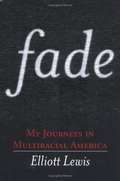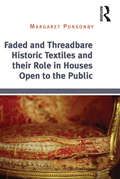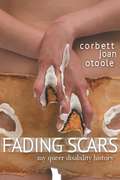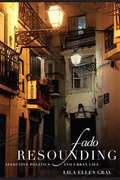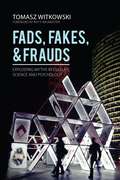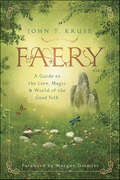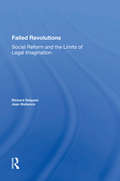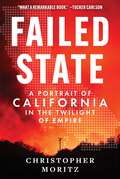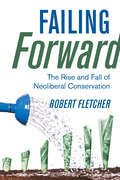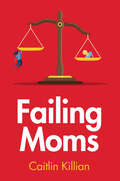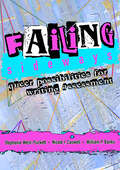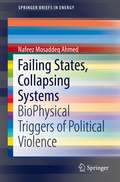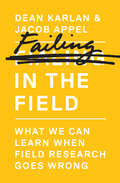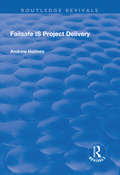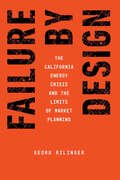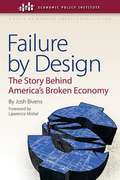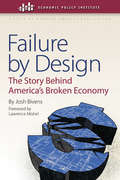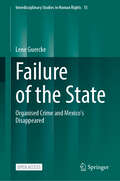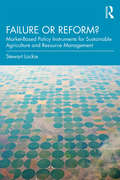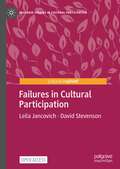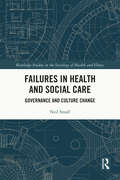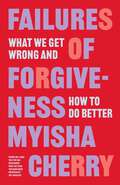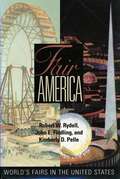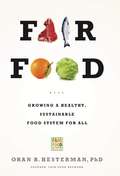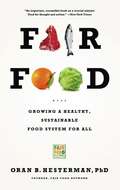- Table View
- List View
Fade: My Journeys In Multiracial America
by Elliott Lewis"Are you black?" "Is your father a white man?" "Are you really black or white?" "You are some kind of black, aren't you?" Questions like these have confused, intrigued, and vexed the author as he grew up as a light-skinned, biracial young man. The only son of 2 biracial parents, the author has had to sort through a myriad of conflicting emotions, ideas, and society's views of him to find out who he really is. Echoed by many racially mixed people around the country, Lewis sees himself as biracial, neither blank nor white, but just himself. He shows how race isn't necessarily tied to skin color or tone and shows how one's identity is shaped by the culture and parental attitudes that are present as a person grows. He challenges us to see that there is a world of people in the middle so that it's not just black and white anymore.
Faded and Threadbare Historic Textiles and their Role in Houses Open to the Public: Historic Textiles And Their Role In Houses Open To The Public
by Margaret PonsonbyMany historic houses that open to the public in England and Wales - particularly those owned by the National Trust - preserve their contents rather than restore them to a particular period. The former owners of these houses often retained objects from various periods and this layering of history produces interiors that look aged and patinated. Although the reason for this preservation and lack of fashionable renewable can be attributed to declining economic fortunes in the twentieth century, there are many examples of families practising this method of homemaking over a much longer period. Taking National Trust properties as its central focus, this book examines three interlocking themes to examine the role of historic textiles. Firstly it looks at houses with preserved contents together with the reasons for individual families choosing this lifestyle; secondly the role of the National Trust as both guardian and interpreter of these houses and their collections; and finally, and most importantly, the influence of textiles to contribute to the appearance of interiors, and their physical attributes that carry historical resonances of the past. The importance of preserved textiles in establishing the visual character of historic houses is a neglected area and therefore the prominence given to textiles in this project constitutes an original contribution to the study of these houses. Drawing upon a range of primary sources, including literature produced by the National Trust for their sites, and documentary sources for the families and their houses (such as diaries, letters and household accounts), the study takes a broad approach that will be of interest to all those with an interest in material culture, heritage, collecting studies and cultural history.
Fading Scars: My Queer Disability History
by Corbett Joan OtooleUncovering stories about disability history and life, OToole shares her firsthand account of some of the most dramatic events in Disability History, and gives voice to those too often yet left out. From the 504 Sit-in and the founding of the Center for Independent Living in Berkeley, to the Disability Forum at the International Woman's Conference in Beijing; through dancing, sports, queer disability organizing and being a disabled parent, OToole explores her own and the disability community's power and privilege with humor, insight and honest observations.<P><P> "Corbett Joan OToole's Fading Scars: My Queer Disabled History is like a song-an anthem, a lullaby, a ballad, a love lyric and a chant all at once. This book of essays chronicles one person's life, but also the 40 years that disability rights and disability justice shaped American history. Its first-person accounts of historical events, fierce focus on disabled identities, and consistently accessible language and structure make it unusual-perhaps even unique-among disability memoirs. Bursting with ideas, stories, and arguments, Fading Scars is a book in which experience accrues into knowledge and emerges through the written word as wisdom. Fading Scars combines razor-sharp organization with passages of lyrical beauty. It establishes a new standard, perhaps even the beginning of a new aesthetic, for disability writing." - Margaret Price, author of Mad at School: Rhetorics of Mental Disability and Academic Life.<P> "Illuminating disability history with clear and funny stories, this book builds a home where those of us who have lived on the sidelines can seek shelter." - Naomi Ortiz, Writer, Artist and Disability Justice Activist<P> "Fading Scars is a must read for those interested in disability community, activism, and scholarship." - Kim Nielsen, author of A Disability History of the United States (ReVisioning American History)
Fado Resounding: Affective Politics and Urban Life
by Lila Ellen GrayFado, Portugal's most celebrated genre of popular music, can be heard in Lisbon clubs, concert halls, tourist sites, and neighborhood bars. Fado sounds traverse the globe, on internationally marketed recordings, as the "soul" of Lisbon. A fadista might sing until her throat hurts, the voice hovering on the break of a sob; in moments of sung beauty listeners sometimes cry. Providing an ethnographic account of Lisbon's fado scene, Lila Ellen Gray draws on research conducted with amateur fado musicians, fadistas, communities of listeners, poets, fans, and cultural brokers during the first decade of the twenty-first century. She demonstrates the power of music to transform history and place into feeling in a rapidly modernizing nation on Europe's periphery, a country no longer a dictatorship or an imperial power. Gray emphasizes the power of the genre to absorb sounds, memories, histories, and styles and transform them into new narratives of meaning and "soul."
Fads, Fakes, and Frauds: Exploding Myths in Culture, Science and Psychology
by Tomasz WitkowskiThis book is a collection of skeptical social essays in which the author reveals that much of our popular beliefs, psychology and science are defective, because, although we live in the 21st century, our approach to them is deeply rooted in our culture, a
Faery: A Guide to the Lore, Magic & World of the Good Folk
by John T. KruseCONNECT WITH THE GOOD FOLK AND OPEN YOURSELF TO AMAZING POSSIBILITIESThis impressive book is both a folkloric resource and guide to living and working with your magical neighbors. Featuring an expansive look at the world of Faery and the history, behavior, and appearance of the Good Folk, Faery provides detailed and practical advice based on local legends and real encounters.John T. Kruse dives deep into the rich cultural traditions of the British Isles, revealing the symbiotic relationship between humans and faeries. Explore the magic, habits, and culture of the Good Folk. Discover the different types of faeries, how to find them, and what precautions you should take when working with them. Respectful and thorough, this book will enrich your life and teach you how to truly feel the presence of the Good Folk.Includes a foreword by faery expert Morgan Daimler.
Failed Revolutions: Social Reform And The Limits Of Legal Imagination
by Richard DelgadoForty years after school integration became the law of the land, African-American poverty, isolation, and despair are as deep as ever. Thirty years after the environmental revolution of the 1960s, our environment continues to deteriorate. Why have these and so many other hopeful revolutions failed? Focusing on the crucial discipline of the law,
Failed State: A Portrait of California in the Twilight of Empire
by Christopher MoritzCalifornia was once the crown jewel of the American dream: prosperous, innovative, egalitarian, and aspirational. Today, it stands as a dystopian warning of what happens when nihilistic, radical ideology consumes the foundations of governance. In Failed State, Christopher Moritz dissects the unraveling of the Golden State with the precision of a lawyer, the depth of a historian, and the heartbreak of a California native son who has witnessed its collapse firsthand. Through disturbing, relentless detail drawn from whistleblowers, law enforcement insiders, and classified reports, he exposes the corrosive and deadly impact of progressive policies that have prioritized criminals over victims, cartels over citizens, and ideological dogma over law and order. Moritz reveals the architects of this catastrophe: rogue prosecutors bankrolled by anarchist billionaires, open-border zealots who have transformed California into a cartel haven, and policymakers who have gutted public safety in the name of equity. The 2025 Palisades Fire, a man-made disaster, epitomize this descent into chaos. Fire hydrants ran dry while organized looters turned evacuation zones into war zones. Resources were squandered on symbolic virtue-signaling as ordinary citizens were left defenseless in the face of destruction. These failures are not isolated—they are the inevitable result of policies designed to dismantle civic order and empower anarchic forces at the expense of law-abiding Americans. Yet, Failed State is more than an autopsy of California&’s collapse. Drawing on historical parallels—from the Bolshevik Revolution&’s destruction of Christian Russia to the ethnic cleansing of Rhodesia by Mugabe&’s communists—Moritz warns that California&’s crisis is not contained to the Golden State. It is a harbinger for America&’s future if these radical trends metastasize nationwide. His searing analysis reveals the systematic dismantling of civil society and the betrayal of a state&’s duty to its citizens, all in service of an anti-civilization agenda cloaked in the language of progress. Unflinching, provocative, and unapologetically honest, Failed State is a rallying cry for those who refuse to stand by as America&’s most prosperous state spirals into lawlessness and disorder. For those seeking clarity amid chaos, Christopher Moritz delivers a blistering indictment of failed leadership and a warning that the unraveling of California could signal that unraveling of the nation itself.
Failing Forward: The Rise and Fall of Neoliberal Conservation
by Robert FletcherFailing Forward documents the global rise of neoliberal conservation as a response to biodiversity loss and unpacks how this approach has managed to "fail forward" over time despite its ineffectiveness. At its core, neoliberal conservation promotes market-based instruments intended to reconcile environmental preservation and economic development by harnessing preservation itself as the source of both conservation finance and capital accumulation more generally. Robert Fletcher describes how this project has developed over the past several decades along with the expanding network of organizations and actors that have come together around its promotion. Drawing on Lacanian psychoanalysis, he explores why this strategy continues to captivate states, nongovernmental organizations, international financial institutions, and the private sector alike despite its significant deficiencies. Ultimately, Fletcher contends, neoliberal conservation should be understood as a failed attempt to render global capitalism sustainable in the face of its intensifying social and ecological contradictions. Consequently, the only viable alternative capable of simultaneously achieving both environmental sustainability and social equity is a concerted program of "degrowth" grounded in post-capitalist principles.
Failing Moms: Social Condemnation and Criminalization of Mothers
by Caitlin KillianWhile many claim that being a mom is the most important job in the world, in reality motherhood in the United States is becoming harder. From preconception, through pregnancy, and while parenting, women are held to ever-higher standards and are finding themselves punished – both socially and criminally – for failing to live up to these norms. This book uncovers how women of all ethnic backgrounds and socioeconomic statuses have been interrogated, held against their will, and jailed for a rapidly expanding list of offenses such as falling down the stairs while pregnant or letting a child spend time alone in a park, actions that were not considered criminal a generation ago. While poor mothers and moms of color are targeted the most, all moms are in jeopardy, whether they realize it or not. Women and mothers are disproportionately held accountable compared to men and fathers who do not see their reproduction policed and almost never incur charges for “failure to protect.” The gendered inequality of prosecutions reveals them to be more about controlling women than protecting children. Using a reproductive justice lens, Caitlin Killian analyzes how and why mothers are on a precipice and what must change to prevent mass penalization and instead support mothers and their children.
Failing Sideways: Queer Possibilities for Writing Assessment
by William P. Banks Nicole I. Caswell Stephanie West-PuckettFailing Sideways is an innovative and fresh approach to assessment that intersects writing studies, educational measurement, and queer rhetorics. While valuing and representing the research, theory, and practice of assessment, authors Stephanie West-Puckett, Nicole I. Caswell, and William P. Banks demonstrate the ways that students, teachers, and other interested parties can find joy and justice in the work of assessment. A failure-oriented assessment model unsettles some of the most common practices, like rubrics and portfolios, and challenges many deeply held assumptions about validity and reliability in order to ask what could happen if assessment was oriented toward possibility and potential. Working to engage a more capacious writing construct, the authors propose queer validity inquiry (QVI) as a model for assessment that values failure, affect, identity, and materiality. These overlapping lenses help teachers honor parts of writing and learning that writing studies faculty have struggled to hold onto in a world overly focused on quickness and efficiency in schools. Through programmatic and classroom examples, Failing Sideways privileges what is valued in the classroom but traditionally ignored in assessments. Reimagining what matters in the teaching and learning of writing and using assessment data differently, this book demonstrates what writing can be and could do in a more diverse and just world.
Failing States, Collapsing Systems
by Nafeez Mosaddeq AhmedThis work executes a unique transdisciplinary methodology building on the author's previous book, A User's Guide to the Crisis of Civilization: And How to Save it (Pluto, 2010), which was the first peer-reviewed study to establish a social science framework for the integrated analysis of crises across climate, energy, food, economic, terror and the police state. Since the 2008 financial crash, the world has witnessed an unprecedented outbreak of social unrest in every major continent. Beginning with the birth of the Occupy movement and the Arab Spring, the eruption of civil disorder continues to wreak havoc unpredictably from Greece to Ukraine, from China to Thailand, from Brazil to Turkey, and beyond. Yet while policymakers and media observers have raced to keep up with events, they have largely missed the biophysical triggers of this new age of unrest - the end of the age of cheap fossil fuels, and its multiplying consequences for the Earth's climate, industrial food production, and economic growth. This book for the first time develops an empirically-ground theoretical model of the complex interaction between biophysical processes and geopolitical crises, demonstrated through the analysis of a wide range of detailed case studies of historic, concurrent and probable state failures in the Middle East, Northwest Africa, South and Southeast Asia, Europe and North America. Geopolitical crises across these regions, Ahmed argues, are being driven by the proliferation of climate, food and economic crises which have at their root the common denominator of a fundamental and permanent disruption in the energy basis of industrial civilization. This inevitable energy transition, which will be completed well before the close of this century, entails a paradigm shift in the organization of civilization. Yet for this shift to result in a viable new way of life will require a fundamental epistemological shift recognizing humanity's embeddedness in the natural world. For this to be achieved, the stranglehold of conventional models achieved through the hegemony of establishment media reporting - dominated by fossil fuel interests - must be broken. While geopolitics cannot be simplistically reduced to the biophysical, this book shows that international relations today can only be understood by recognizing the extent to which the political is embedded in the biophysical. Although the book offers a rigorous scientific analysis, it is written in a clean, journalistic style to ensure readability and accessibility to a general audience. It will contain a large number of graphical illustrations concerning oil production data, population issues, the food price index, economic growth and debt, and other related issues to demonstrate the interconnections and correlations across key sectors.
Failing in the Field: What We Can Learn When Field Research Goes Wrong
by Dean Karlan Jacob AppelAll across the social sciences, from development economics to political science departments, researchers are going into the field to collect data and learn about the world. While much has been gained from the successes of randomized controlled trials, stories of failed projects often do not get told. In Failing in the Field, Dean Karlan and Jacob Appel delve into the common causes of failure in field research, so that researchers might avoid similar pitfalls in future work. Drawing on the experiences of top social scientists working in developing countries, this book delves into failed projects and helps guide practitioners as they embark on their research. From experimental design and implementation to analysis and partnership agreements, Karlan and Appel show that there are important lessons to be learned from failures at every stage. They describe five common categories of failures, review six case studies in detail, and conclude with some reflections on best (and worst) practices for designing and running field projects, with an emphasis on randomized controlled trials. There is much to be gained from investigating what has previously not worked, from misunderstandings by staff to errors in data collection.Cracking open the taboo subject of the stumbles that can take place in the implementation of research studies, Failing in the Field is a valuable "how-not-to" handbook for conducting fieldwork and running randomized controlled trials in development settings.
Failsafe IS Project Delivery (Routledge Revivals)
by Andrew HolmesThis title was first published in 2001. Based on research and practical experience, this text highlights the contributory factors leading to project failure. The buisiness-IT culture gap, information politics, escalating commitment, the problem of high investment and low return, and accountability for failure are all covered.
Failure by Design: The California Energy Crisis and the Limits of Market Planning
by Georg RilingerA new framework for studying markets as the product of organizational planning and understanding the practical limits of market design. The Western energy crisis was one of the great financial disasters of the past century. The crisis began in April 2000, when price spikes started to rattle California’s electricity markets. Decades later, some blame economic fundamentals and ignorant politicians, while others accuse the energy sellers who raided the markets. In Failure by Design, sociologist Georg Rilinger offers a different explanation, one that focuses on the practical challenges of market design. The unique physical attributes of electricity made it exceedingly difficult to introduce markets into the coordination of the electricity system, so market designers were brought in to construct the infrastructures that coordinate how market participants interact. An exercise in social engineering, these infrastructures were intended to guide market actors toward behavior that would produce optimal market results and facilitate grid management. Yet, though these experts spent their days worrying about incentive misalignment and market manipulation, they unintentionally created a system riddled with opportunities for destructive behavior. Rilinger’s analysis not only illuminates the California energy crisis but also develops a broader theoretical framework for thinking about markets as the products of organizational planning and the limits of social engineering, contributing broadly to sociological and economic thinking about the nature of markets.
Failure by Design: The Story Behind America's Broken Economy
by Josh Bivens Lawrence MishelWith this book, the Economic Policy Institute, a nonprofit think-tank focusing on the economic conditions of low- and middle-income workers, for the first time presents its data in the form of a readable narrative and interpretation written especially for general readers and students, made accessible with numerous charts and graphs. Bivens, an economist at the Economic Policy Institute and a frequent commentator for major media outlets, demonstrates that the Great Recession of 2008 was "driven by cluelessness and greed on the part of the country's financial elite," focusing on poor policy choices since the late 1970s. He examines the causes and impact of the Great Recession and explains evidence on jobs, incomes, wages, and other factors most relevant to low- and middle-income workers. He also describes what remains to be done to reform exchange rate, monetary, and fiscal policies. A companion website, "The State of Working America," provides the think-tank's annual compilations of economic data in interactive, downloadable charts and graphs, along with detailed readings on topics such as income inequality. The book lacks a subject index. IRL Press is an imprint of Cornell University Press. Annotation ©2011 Book News, Inc. , Portland, OR (booknews. com)
Failure by Design: The Story behind America's Broken Economy (Economic Policy Institute)
by Josh BivensIn Failure by Design, the Economic Policy Institute's Josh Bivens takes a step back from the acclaimed State of Working America series, building on its wealth of data to relate a compelling narrative of the U. S. economy's struggle to emerge from the Great Recession of 2008. Bivens explains the causes and impact on working Americans of the most catastrophic economic policy failure since the 1920s. As outlined clearly here, economic growth since the late 1970s has been slow and inequitably distributed, largely as a result of poor policy choices. These choices only got worse in the 2000s, leading to an anemic economic expansion. What growth we did see in the economy was fueled by staggering increases in private-sector debt and a housing bubble that artificially inflated wealth by trillions of dollars. As had been predicted, the bursting of the housing bubble had disastrous consequences for the broader economy, spurring a financial crisis and a rise in joblessness that dwarfed those resulting from any recession since the Great Depression. The fallout from the Great Recession makes it near certain that there will be yet another lost decade of income growth for typical families, whose incomes had not been boosted by the previous decade's sluggish and localized economic expansion. In its broad narrative of how the economy has failed to deliver for most Americans over much of the past three decades, Failure by Design also offers compelling graphic evidence on jobs, incomes, wages, and other measures of economic well-being most relevant to low- and middle-income workers. Josh Bivens tracks these trends carefully, giving a lesson in economic history that is readable yet rigorous in its analysis. Intended as both a stand-alone volume and a companion to the new State of Working America website that presents all of the data underlying this cogent analysis, Failure by Design will become required reading as a road map to the economic problems that confront working Americans.
Failure of the State: Organised Crime and Mexico's Disappeared (Interdisciplinary Studies in Human Rights #15)
by Lene GuerckeThis Open Access book explores an issue that has received little attention in human rights research: organised criminal groups (OCGs) as perpetrators of human rights violations, especially disappearances. It takes an interdisciplinary approach, combining doctrinal legal research with a qualitative study on present-day disappearances in Mexico. Disappearances are a complex human rights violation that impacts not only the disappeared person but also their relatives, who are left in a limbo of uncertainty about their loved one’s fate. Originally part of state-led repression, today disappearances occur in varied contexts, often involving OCGs and other non-state actors. However, disappearances committed by non-state actors are not human rights violations under International Human Rights Law (IHRL), thereby potentially leaving a gap in the legal protection of victims. The book first analyses state obligations and case law involving state responsibility for human rights violations committed by non-state actors and applies the analysis to OCGs. This ‘internal’ legal perspective is complemented by an ‘external’ study based on interviews with human rights practitioners working on disappearances in Mexico, which often involve OCGs. The qualitative study offers a unique perspective on human rights protection ‘in reality’. The book adds to scholarship on non-state actors and disappearances, and to incipient international legal scholarship on the issue of organised crime and international law. Moreover, the study on Mexico provides a richer understanding of challenges faced by practitioners ‘on the ground’ where OCGs commit human rights violations alongside, or in collusion with, state forces and against the backdrop of an overall failure of the state. The book may be of interest to a diverse audience, including legal scholars and practitioners, human rights scholars in fields such as political science, international relations, or socio-legal studies, as well as funders supporting the work of NGOs in Mexico and similar contexts, and NGOs themselves.
Failure or Reform?: Market-Based Policy Instruments for Sustainable Agriculture and Resource Management
by Stewart LockieMarket reform promises more environmental protection and more profitable agriculture at lower financial cost. Too good to be true? This book examines numerous empirical examples of policy in action to identify principles for the successful application of market-based policy instruments. Where some market instruments are used to fix market failures by putting a value on environmental protection, others use market-like mechanisms to allocate financial incentives for environmental work. They are promoted as flexible, efficient and politically neutral solutions to the competing demands of social, economic and ecological sustainability. But they also attract criticism for rolling back environmental regulation and privatizing public goods. This book argues that while many market-based instruments have merit, decisions about responsibility cannot be left entirely to the market. Whichever instruments we use, decision-making needs to be embedded in a logic of democratization. Using case studies from around the world, this book investigates how instruments like eco-standards, payments for ecosystem services, pollution trading and community-based natural resource management perform in practice, and what can be learned about applying them more effectively. While the approach is primarily sociological, it is deliberately written to bridge the gap between sociology, economics, environmental sciences and the concerns of environmental policy makers.
Failures in Cultural Participation (Palgrave Studies in Cultural Participation)
by David Stevenson Leila JancovichThis open access book examines how and why the UK's approach towards increasing cultural participation has largely failed to address inequality and inequity in the subsidised cultural sector despite long-standing international policy discourse on this issue. It further examines why meaningful change in cultural policy has not been more forthcoming in the face of this apparent failure. This work examines how a culture of mistrust, blame, and fear between policymakers, practitioners, and participants has resulted in a policy environment that engenders overstated aims, accepts mediocre quality evaluations, encourages narratives of success, and lacks meaningful critical reflection. It shows through extensive field work with cultural professionals and participants how the absence of criticality, transparency, and honesty limits the potential for policy learning, which the authors argue is a precondition to any radical policy change and is necessary for developing a greater understanding of the social construction of policy problems. The book presents a new framework that encourages more open and honest conversations about failure in the cultural sector to support learning strategies that can help avoid these failures in the future.
Failures in Health and Social Care: Governance and Culture Change
by Neil SmallThis thought-provoking book examines breakdowns in the quality of health and social care over the past decade, exploring governance failures and the challenges of achieving lasting change. Failures in care have been manifest across many different settings. Drawing on examples from care of older people and end-of-life care, as well as from learning disabilities, mental health, maternity care and services for vulnerable children, Neil Small shows that the same sorts of problems are evident across these settings and that they are occurring up to the present day. Discussing culture change alongside levels of funding and the impact of prevailing political and economic orthodoxies, and through the lens of shifts of trust in society, this book argues that the concept of culture must be cast much wider than organisational and professional cultures if change is to be secured. This book engages with how to improve quality of care in the NHS and welfare systems more generally. Its case examples are from the UK but the issues of governance, culture change and shifts in the social contract that failures illuminate have an international relevance. It is important reading for those with an interest in health, social care, political science, and sociology.
Failures of Forgiveness: What We Get Wrong and How to Do Better
by Myisha CherryPhilosopher Myisha Cherry teaches us the right ways to deal with wrongdoing in our lives and the worldSages from Cicero to Oprah have told us that forgiveness requires us to let go of negative emotions and that it has a unique power to heal our wounds. In Failures of Forgiveness, Myisha Cherry argues that these beliefs couldn’t be more wrong—and that the ways we think about and use forgiveness, personally and as a society, can often do more harm than good. She presents a new and healthier understanding of forgiveness—one that will give us a better chance to recover from wrongdoing and move toward “radical repair.”Cherry began exploring forgiveness after some relatives of the victims of the mass shooting at Emanuel A.M.E. Church in Charleston, South Carolina, forgave what seemed unforgiveable. She was troubled that many observers appeared to be more inspired by these acts of forgiveness than they were motivated to confront the racial hatred that led to the killings. That is a big mistake, Cherry argues. Forgiveness isn’t magic. We can forgive and still be angry, there can be good reasons not to forgive, and forgiving a wrong without tackling its roots solves nothing. Examining how forgiveness can go wrong in families, between friends, at work, and in the media, politics, and beyond, Cherry addresses forgiveness and race, canceling versus forgiving, self-forgiveness, and more. She takes the burden of forgiveness off those who have been wronged and offers guidance both to those deciding whether and how to forgive and those seeking forgiveness.By showing us how to do forgiveness better, Failures of Forgiveness promises to transform how we deal with wrongdoing in our lives, opening a new path to true healing and reconciliation.
Fair America: World's Fairs in the United States
by Kimberly Pelle John E. Findling Robert W. RydellSince their inception with New York's Crystal Palace Exhibition in the mid-nineteenth century, world's fairs have introduced Americans to "exotic" pleasures such as belly dancing and the Ferris Wheel; pathbreaking technologies such as telephones and X rays; and futuristic architectural, landscaping, and transportation schemes. Billed by their promoters as "encyclopedias of civilization," the expositions impressed tens of millions of fairgoers with model environments and utopian visions.Setting more than 30 world's fairs from 1853 to 1984 in their historical context, the authors show that the expositions reflected and influenced not only the ideals but also the cultural tensions of their times. As mainstays rather than mere ornaments of American life, world's fairs created national support for such issues as the social reunification of North and South after the Civil War, U.S. imperial expansion at the turn of the 20th-century, consumer optimism during the Great Depression, and the essential unity of humankind in a nuclear age.
Fair Food
by Oran B. HestermanA host of books and films in recent years have documented the dangers of our current food system, from chemical runoff to soaring rates of diet-related illness to inhumane treatment of workers and animals. But advice on what to do about it largely begins and ends with the admonition to "eat local or "eat organic." Fair Food is an enlightening and inspiring guide to changing not only what we eat, but how food is grown, packaged, delivered, marketed, and sold. Oran B. Hesterman shows how our system's dysfunctions are unintended consequences of our emphasis on efficiency, centralization, higher yields, profit, and convenience--and defines the new principles, as well as the concrete steps, necessary to restructuring it. Along the way, he introduces people and organizations across the country who are already doing this work in a number of creative ways, from bringing fresh food to inner cities to fighting for farm workers' rights to putting cows back on the pastures where they belong. He provides a wealth of practical information for readers who want to get more involved.
Fair Food: Growing a Healthy, Sustainable Food System for All
by Oran HestermanOur food system is broken, and it’s endangering what’s most precious to us: our environment, our health, our soil and water, and our future. In recent years, a host of books and films have compellingly documented the dangers. But advice on what to do about them largely begins and ends with the admonition to "eat local” or "eat organic. ” Longtime good food pioneer Oran Hesterman knows that we can’t fix the broken system simply by changing what’s on our own plates: the answer lies beyond the kitchen. InFair Foodhe shares an inspiring and practical vision for changing not only what we eat, but how food is grown, packaged, delivered, marketed, and sold. He introduces people and organizations across the country who are already doing this work in a number of creative ways, and provides a wealth of practical information for readers who want to get more involved.
